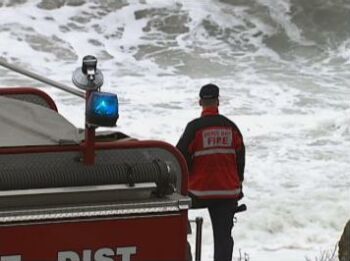
Publisher:
Bonnie King
CONTACT:
Newsroom@Salem-news.com
Advertising:
Adsales@Salem-news.com

~Truth~
~Justice~
~Peace~
TJP
May-24-2006 14:25

 TweetFollow @OregonNews
TweetFollow @OregonNews
Salem-News.com Safe & Sound Report: Memorial Day Boating Reminders
Salem-News.com
 Rescue at Lincoln Beach last summer Photo By: Tim King |
(SALEM) - If you are heading out on the water this Memorial Day weekend, the Oregon State Marine Board has some tips to keep you and your family Safe & Sound while out on the water. It may be information we have all heard before, but death by drowning happens only once in a lifetime.
Wear A Life Jacket
It was only recently on the Oregon coast, three lives were lost that could have been saved if the boaters were wearing life jackets. Accidents happen but they don't have to be fatal accidents. One thing is certain -life jackets save lives.
Here's another reason why it's important to wear a life jacket; all waterways are cold this time of year in Oregon. In fact most Oregon waterways are cold year-round.
Understand Cold Water Immersion
There are four stages of cold water immersion:
Stage 1: Initial "cold shock" occurs in the first 3-5 minutes of immersion. Sudden immersion into cold water can cause involuntary gasping, hyperventilation, panic, and vertigo -all which can result in water inhalation and drowning. Immersion in cold water can also cause sudden changes in blood pressure, heart rate, and heart rhythm, which can also result in death.
Stage 2: Short-term "swim failure" occurs 3-30 minutes into immersion in cold water. Muscles and nerves in the arms and legs cool quickly. Manual dexterity, hand grip strength, and speed of movement can all drop by 60-80 percent. Even normally strong people can lose the strength necessary to pull themselves out of the water or even to keep their head above water. Death occurs by drowning.
Stage 3: Long-term immersion hypothermia begins within 30 minutes depending on the water temperature, clothing, body type, and your behavior in the water. Cold water robs the body of heat 25 times faster than cold air. Hypothermia occurs when your body loses heat faster than it produces it, cooling the organs in the core of your body.
Hypothermia eventually leads to loss of consciousness and death, with or without drowning.
Stage 4: Post-immersion collapse occurs during or after a rescue. Once rescued, if you have been immersed in cold water you are still in danger from collapse of arterial blood pressure leading to a heart attack. Also, inhaled water can damage your lungs, and heart problems can develop as cold blood from arms and legs is released into the core of your body.
Your chance of surviving a cold water immersion depends on having sufficient flotation to keep your head above water, controlling your breathing, timely rescue by yourself or others, and heat retention.
Prepare for boating in cold water conditions by wearing a life jacket and layered clothing for insulation.
Equip your vessel with a means for re-entry (ladder, sling, etc.) to use if you fall in.
Of course, the best prevention is to take all measures necessary to avoid capsizing or falling into cold water.
If you do fall into the water, follow these tips:
Try to get control of your breathing. Hold onto something or stay as still as possible until your breathing settles down. Focus on floating with your head above water until the cold shock response subsides.
Try to get out of the water. If your boat capsizes, stay with the boat and pull yourself out of the water as much as you can.
If for whatever reason you were not wearing a life jacket when entering the water, look to see if one is floating around you and try to put it on. Do not take your clothes off. A layer of water trapped inside your clothing will help insulate you.
Stay as motionless as possible to conserve heat. Reduce heat loss by bringing your legs up to your chest and crossing your arms by holding onto your life jacket. If others are in the water with you, huddle together to reduce heat loss.
If you must swim, conserve energy and minimize movement. Swim on your back and flutter-kick with your lower legs.
Boat Sober
In 2004 in Oregon, one third of boating fatalities involved alcohol.
Alcohol's effects on judgment, vision, balance and coordination are amplified on the water, increasing the likelihood of boating accidents.
Just recently, a severe boat fire occurred on the Columbia River and the boat operator was arrested for boating under the influence of intoxicants. Boating under the influence of intoxicants (BUII) is illegal in Oregon.
Articles for May 23, 2006 | Articles for May 24, 2006 | Articles for May 25, 2006

Quick Links
DINING
Willamette UniversityGoudy Commons Cafe
Dine on the Queen
Willamette Queen Sternwheeler
MUST SEE SALEM
Oregon Capitol ToursCapitol History Gateway
Willamette River Ride
Willamette Queen Sternwheeler
Historic Home Tours:
Deepwood Museum
The Bush House
Gaiety Hollow Garden
AUCTIONS - APPRAISALS
Auction Masters & AppraisalsCONSTRUCTION SERVICES
Roofing and ContractingSheridan, Ore.
ONLINE SHOPPING
Special Occasion DressesAdvertise with Salem-News
Contact:AdSales@Salem-News.com




Terms of Service | Privacy Policy
Comments are Closed on this story.
[Return to Top]
©2026 Salem-News.com. All opinions expressed in this article are those of the author and do not necessarily reflect those of Salem-News.com.